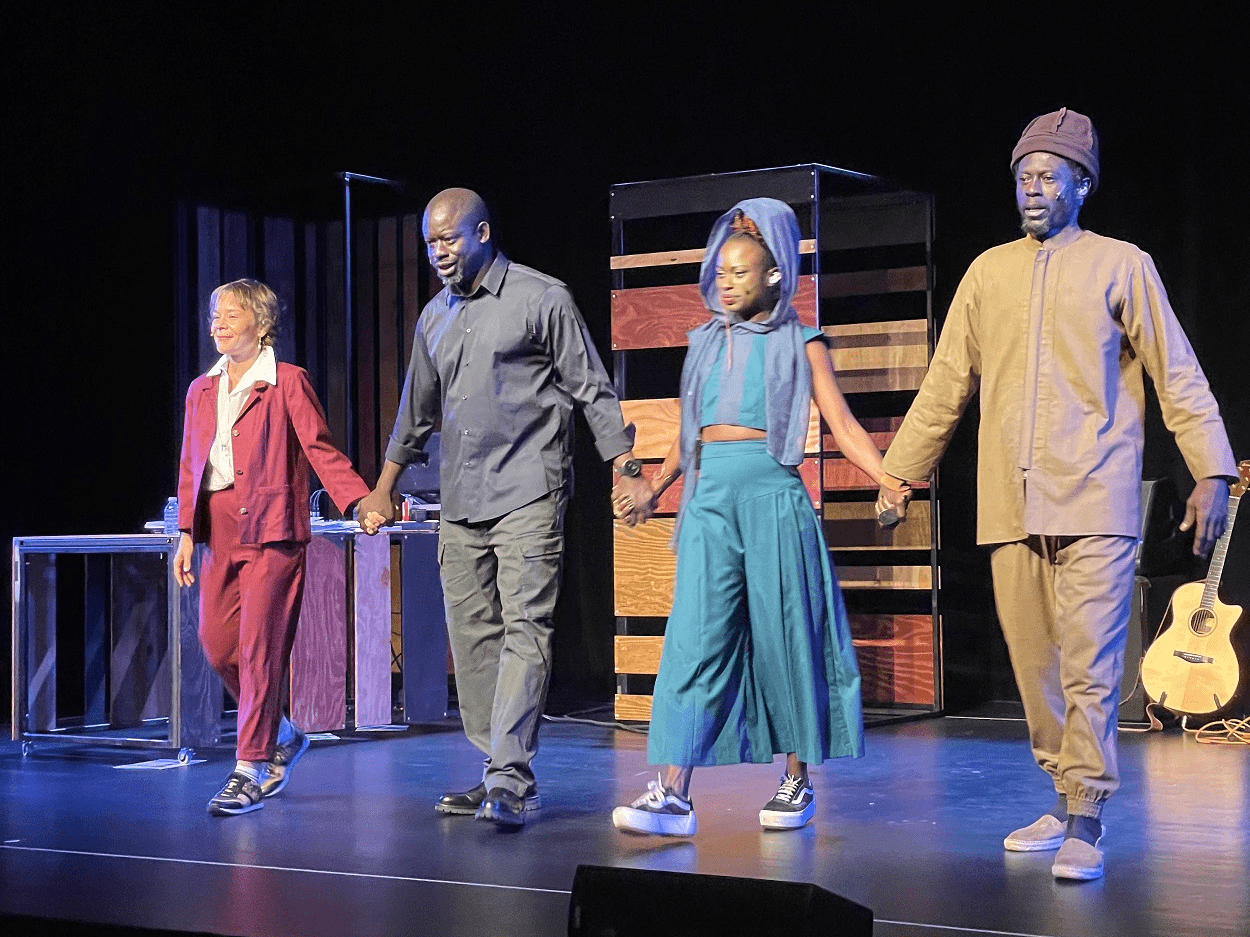Editor’s Observe: This text was produced in collaboration with the Arts & Culture MA concentration at Columbia College’s Graduate College of Journalism.
***
“Life that wishes to be life. Life that persists and soars. How will we free those that are already free?” That is the ultimate query of Felwine Sarr and Dorcy Rugamba’s Freedom, I’ll have lived your dream till the final day, carried out (in French with English subtitles) on the French Institute Alliance Française (FIAF) Florence Gould Corridor Theater as part of this yr’s Crossing the Line Festival. The play itself stands as the reply to this query, as Sarr makes use of the stage as his platform to rejoice Black id and pay homage to his philosophical influences.
The work is a chic marriage between students of African tradition. The Senegalese author Sarr is a lifelong educational, a professor of African and diasporic philosophy, and a musician. Rugamba, along with being a director and playwright, additionally based the Rwandan Arts Initiative and arrange a publishing home, Moyo, which publishes authors in African languages.


The play, framed as a radio present, opens with a scene of a recording studio with 4 picket cubicles. A desk sits within the heart holding half-full water bottles, a laptop computer, and an built-in audio manufacturing board. One electrical guitar, one acoustic guitar, and one banjo. And scattered all around the ground is a multitude of loose-leaf pages. Laure (Marie-Laure Crochant) is interviewing Dj’djack (Felwine Sarr) about his most up-to-date ebook Richmond Highway, following a dialog between poet René Char and political thinker Frantz Fanon. Although the 2 minds by no means met in life, Dj’djack imagines this dialog, as if he’d seen it in a dream, the 2 of them exchanging concepts in a restaurant.
This dream begins to play out in a mythic track, as fellow performers Majnun and T.I.E take part a musical vignette about Fanon in Martinique throughout World Warfare II, presenting a extremely poetic and philosophical second during which the actors embody the voices of Char and Fanon. The 4 give commendable performances, every taking up the poetry in their very own distinctive means: T.I.E together with her enchanting singing, Majnun together with his infectious physique rhythm, Crochant together with her emotional expression of the textual content, and Sarr together with his simple authority and charisma as he weaves us out and in of the desires.


A number of of those dreamscapes play out over the course of the work, interspersed with interview questions between Laure and Dj’djack. The vignettes act as solutions to the questions on Sarr’s personal philosophy in his writing. Every dream is a brand new complicated concept: warfare, life after a serious upheaval, reinvention and id, poetry, limits, and at last freedom.
T.I.E acts because the Maestra, utilizing a loop on a reside soundstage whereas Majnun lures us in with hypnotic electrical guitar, each singing in soulful, mesmerizing concord. The music and pictures evoke the concepts and feelings of resistance that Char and Fanon cherished of their writing. For instance, the actors marching in unison, calling to Fanon within the Free French Military, when his regiment was not allowed to march with the white troopers; tearing up the scattered pages of paperwork calling to the decolonization of Algiers, resisting the bare violence of Western values, and difficult the colonial group; and at last, clearing the ground of papers as Dj’djack takes heart stage to sing “Highest Our bodies,” an intimate second the place he establishes his personal id unbiased of the histories and philosophies which have shaped his selfhood.


Warfare influenced each Fanon and Char of their writings. Char questioned the function of poetry and literature within the face of bloodshed and violence, urging that it isn’t sufficient to easily write with out motion. However Char didn’t face the racist colonial oppression that Fanon tackles in his work. Fanon strove to “liberate the third worlds from the colonial yoke” and create a liveable world of freedom. He didn’t need to be outlined by his pores and skin colour, nation, or historical past. He writes in his textual content The Wretched of the Earth, colonialism “forces the colonized to continuously ask the query: Who am I in actuality?”
The query of Black id, of “particular person consciousness” because it pertains to “collective destiny,” is one which Sarr grapples with as we speak. He says that he needs to “liberate the Black man from himself.” He devotes his life to the evaluation of Black values, to not be locked in towers of the previous. “I’m not a prisoner of historical past. I’m endlessly creating myself.” These phrases are echoes of Fanon, but in addition of Sarr. He creates this multifaceted concept that a person is concurrently their previous and historical past, but in addition the imaginative and prescient they maintain for his or her future.


This concept culminates superbly in Dj’djack’s last track. The littered stage is cleared and Sarr, T.I.E, and Majnun sing on to the viewers. Their voices free, every performer claiming their very own physique and id.





